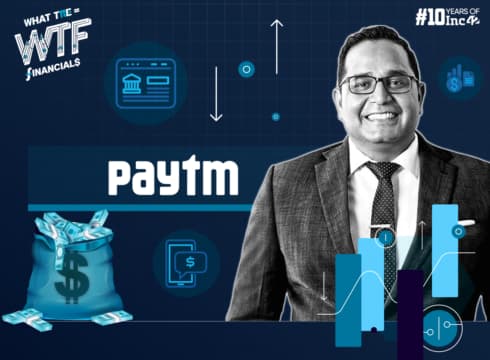Paytm posted a consolidated profit after tax (PAT) of INR 930 Cr in Q2 FY25 as against a loss of INR 292 Cr in the year-ago period
Paytm said that its PAT included a one-time exceptional gain of INR 1,345 Cr on account of sale of its entertainment ticketing business
Revenue from operations fell 34% year-on-year to INR 1,660 Cr in Q2 FY25
Inc42 Daily Brief
Stay Ahead With Daily News & Analysis on India’s Tech & Startup Economy
Fintech major Paytm returned to the black in the September quarter of the financial year 2024-25 (Q2 FY25).
The Vijay Shekhar Sharma-led company posted a consolidated profit after tax (PAT) of INR 930 Cr in Q2 FY25 as against a loss of INR 292 Cr in the year-ago period.
In an earnings statement, Paytm said that its PAT included a one-time exceptional gain of INR 1,345 Cr on account of sale of its entertainment ticketing business. Earlier this year, Paytm sold its movies and events ticketing business to foodtech major Zomato for INR 2,048 Cr in an all-cash deal.
Revenue from operations fell 34% year-on-year to INR 1,660 Cr in the reported quarter from INR 2,519 Cr in the year-ago period. Sequentially, it rose over 10% from INR 1,502 Cr in the June quarter on the back of growth in its bread-and-butter payments and financial services business.
Paytm managed to narrow its adjusted EBITDA (excluding ESOP cost) loss by 221% to INR 186 Cr in Q2 FY25 from a loss of INR 545 Cr in the corresponding quarter last year. The fintech major had posted an adjusted EBITDA profit of INR 153 Cr in the June quarter.
The company spent INR 218 CR in ESOP costs in the reported quarter, down 12% quarter-on-quarter from INR 247 Cr in the quarter ended June 2024 (Q1 FY25).
We remain committed to reach EBITDA before ESOP profitability by Q4 FY25, Paytm said.
Further, the company said that its payments arm, Paytm Payment Services Limited (PPSL) has re-applied to the Reserve Bank of India (RBI) for a payment aggregator licence. In July, Paytm said it had received government’s approval to invest INR 50 Cr in its subsidiary.
Breakdown Of Paytm’s Revenue
Paytm said that its payment services business contributed INR 981 Cr to its revenue during the quarter under review, up 9% quarter-on-quarter, led by an increase in gross merchandise value (GMV), focus on monetisation and increase in merchant subscriptions.
In Q2, GMV stood at INR 4.5 Lakh Cr, up 5% QoQ. In addition, Paytm said it saw a significant improvement in payment processing margin. The company expects payment processing margin (including UPI incentive) to be range bound between 5 and 6 basis points for the year.
As of the quarter ended September 2024, merchant subscriptions stood at 1.12 Cr, with higher active subscriber base driving subscription revenue growth.
The fintech giant said that new subscription paying device merchant sign ups surpassed January 2024 levels. The company said it expects higher active merchant base and higher revenue on account of reactivation of merchants and redeployment of inactive devices to new merchants over the next 2-3 quarters.
Meanwhile, Paytm’s financial services arm generated revenue to the tune of INR 376 Cr, up 34% QoQ. The growth in this segment was driven by an increase in collection bonus in merchant loans and higher share of merchant loans which have better take rate.
The company said that its equity broking, insurance broking and mutual fund distribution segment continues to perform well. As many as 6 Lakh customers availed of Paytm’s financial services in Q2, leaving a large headroom for growth.
Zooming Into Paytm’s Expenses
Paytm managed to trim its overall expenses to INR 2,245 Cr in the reported quarter, down almost 24% from INR 2,937 Cr in the corresponding quarter last year.
Payment Processing Charges: The company’s spending in this bucket fell 37% to INR 516.8 Cr in the reported quarter from INR 816.7 Cr in the year-ago period.
Marketing And Promotional Expense: Paytm spent INR 154.4 Cr towards marketing initiatives in Q2 FY24, down nearly 39% from INR 253 Cr in the corresponding quarter last year.
Employee Benefits Expense: Implementation of AI across businesses helped the fintech major bring down its employee costs (excluding ESOP) to INR 831 Cr during the quarter under review from INR 1,191 Cr in the same quarter last year.
Additionally, Paytm spent INR 218 Cr in ESOP costs in Q2 FY25. The company said it managed to bring this number down from INR 247 Cr in the previous quarter on account of ESOP lapses at the time of employee departures during the quarter.
Shares of Paytm were quoting at INR 699.65 apiece on the BSE at 1 PM, down 3.6% from the previous close.
{{#name}}{{name}}{{/name}}{{^name}}-{{/name}}
{{#description}}{{description}}...{{/description}}{{^description}}-{{/description}}
Note: We at Inc42 take our ethics very seriously. More information about it can be found here.


